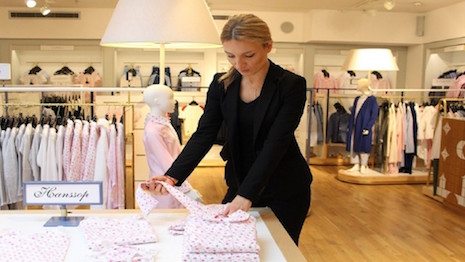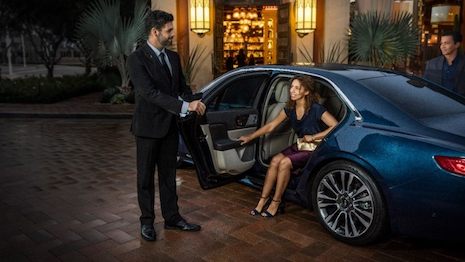NEW YORK – In an environment where luxury goods and experiences are now easily accessible to the mass market, premium brands need to take their services to the next level.
During a session held by the Luxury Marketing Council on March 14, executives from Bond Brand Loyalty exhibited how luxury brands can still miss the mark on fundamentals of making an experience personal. Hospitality needs to be a part of every retail experience, not just travel anymore, where brands offer one-of-a-kind service to every big spending customer.
“Marketers need to know the difference between person and persona,” said Morana Bakula, vice president of customer experience at Bond Brand Loyalty. “They have the ability.
“These companies have the technology but they are not stitching the two together,” she said. “Companies spend so much money on marketing, new products and looking at big stats.
“But what they often fail to do is understand the basic human need.”
Personalization in branding
While big data and artificial intelligence rule all in today’s marketing world, human touch is still a highly effective portion of a business.
Many companies can see a disconnect between their company culture and their customer experience, which will affect the end product.
Bond Brand Loyalty gave an example of how one hotel brand sought to rectify a common issue seen with luxury hotel brands: dry cleaning.

Harrods brand values start from within its company with its employees. Image credit: Harrods
With large amounts of dry cleaning going through employees’ hands everyday, it is hard for them to form an emotional connection with each garment. One hotel brand decided to take on an anthropological experiment with its associates who worked in dry cleaning, in which they learned about the history and stories behind the clothing they worked with.
From then on, the dry cleaning experience became exceptional with employees understanding the worth and difference behind a high-end article of clothing. The staff even started to leave handwritten notes for their customers.
While the human touch and interaction is vital to an effective and personalized hospitality experience, data and technology should also be added into the mix.
With such advancement in personalization tech, retailers and brands need to pour resources into a completely customizable experience.
Knowing the difference between catering to a person and a persona is a vital aspect of marketing in the modern world.
Marketers often build personas around what kind of person they think an individual is, such as their demographic information, their name, type of job and where they live.
But factors such as whether or not that person has children or if they travel for business or for pleasure are an important part of the brand experience. If this individual travels for work often, when they are on vacation with friends, their wants and needs are likely extremely varied from those on a business trip.
However, there are some individuals whose needs would be the same on a business trip versus a vacation.

Bond Brand Loyalty's SYNAPZE product can help track the individual customer journey. Image credit
It is components such as these that brands can leverage to really make an impact on affluent consumers and stand out from the onslaught of pseudo-luxury experiences that exist today.
Additional insight
Time-poor consumers are increasingly seeing the value in personalization, but even with this greater acceptance of the use of their data, retailers still need to be careful not to cross the line into "creepy" targeting.
A report from Oracle finds that while consumers are excited about certain technological advances in retail, other inventions leave them uneasy. As retailers look to adapt to the increasingly digital landscape, they should take into account consumers' comfort levels with automation and artificial intelligence (see more).
A panel of executives in luxury fields revealed how to carefully balance the line between helpful and creepy when it comes to personalization in marketing through the use of data.
During the panel, “Turning Numbers Into Identities For True Brand Relationships” at Luxury Interactive 2017, executives from Collective Retreats and Frette explained how data is important to connect with consumers, but it is a humanized touch that makes the impact. While too much personalization can turn off the consumer with an intrusive and creepy feel, the right balance can really make a difference (see more).
“Create a story that the customer can tell,” said Christopher Olshan, chief executive officer at The Luxury Marketing Council. “If you create a story you can retell that’s a better endorsement than anything someone paid by the brand can say.”
{"ct":"FsmMHUbrrd9YM0wjcypgr10eCoR3WbZr\/GRcWqjEuPP1KHFtXbIJb4sJ0Kt0s3l4mMC7d5vZE3ovlyPjQ7Te1eGG\/o5jRnLUSZO1Q\/2UxXhBX321hOvQ6DKTPugs4VC8h\/QOk+EcIWREVSbfN3ovqNwc2\/Qag\/2Z5eXZq+ShKSwyIWB6iguNba8NXqrzSGfxZvP9+SSkU5x2ym9TLpfsbhU54TvBEQDMXgbd\/7eK\/Ykr+k1BZIpko8f0a8mIx2Ug7dsctZAYEgcn8CsP9Np+p2C6yuR50iadluAwg+yo0FqIzord7GrH39M+k5uZ9Oa\/154jIDZWAbFPbHz+dpHiK+0yh64jvgeQV8U0\/zGdBjXGdO5pXNqImXKKedJVuh2vZGahzTtx2h6DxnpvW7NzpUwzsxvP6Ek62r2ufEqkczrRsDU1H7dBppGjKHVr\/EPrdBsSfg0LXUKfpzb9L77yIlZHHQqqldeyTq+oB1R2D4wBFFISXJnvABTJqr3Kf+pFIQrHDNyE7HdS5VXlwHKo2XwIryceamPYMY1gWvxDSHsmHxiTWeTJNTIuVoHDfNN1Wq0juJKyMFTg3NZF1KtIK5reDgRa9SEjCA2g43\/6nk1cmz6kk7vCLbNg\/VesE6YmmHFRsH3e2+EQlcVWNjFG3V4cJ\/S8GSp5SdNBtfZ1XA8S13laoFSgalfhJNrsIXMxBYR\/DZEjSnO7\/Z6xnumtxM37wC1ySRHyS+g6lDGknGWYgLb7SNfdCPe45KIgfoKVhO7ZzE9dnG8TaaWytWQW7XcBu1CIzXQIWtV7RKL+kiuBCJKVL0neHay+MCPwvEihQOwXUsw6wXbXA8BOemcrgG31ZNlTYjBtyQJehb8SRo\/GupKP0YrbrAlQ2Elvpy1zD89rUo3CBM4UhYPvpGpvCcL4rh5jk1\/NsXTZkbLzhtfyneBB6tpKtjf2LPtGzK67Xsd1DfKi0pNRbq\/p7V5IAvaj0Z+yj4Ea4CboUxj6lmEio49IKsZNtXU6rzhl2KGxHO2iUP0vB0ZBXoa8LV+f5P\/xXieyAL3xTX5qqH\/4RoenEp\/0tKcGZZ79peH3mNdyPnXI230qwVCp7PE3DX6VFRV69dY+850HMjsnH8+PfH0L56FBDTkClOvCHC3QCubKdbo55HOid9vf9O6oS3nA2eD4H0zf6uuiNJ4aXmWNoFbWGt5RuZBhiEGMzRHPZlhq+jHp8VOOCXjjkwyK9FBGEKRc9teY37QFbT223V4Bg3ffcTpRjbgu8KtLKeYYRyayimrup3ctITUS7xYflsGp2lI2Y6UEZLpI2JlynxRJk7StKDlR+Nm30baymYt+FyHTmu4iGb0I7atmAVUd1HurF8KJdTYUpEPMMNq9Jjefj\/voHeyo+uNupbPu3Z8hqMEZGCTCHixn2UhNXXcuZM+WTjUJzRVh3jhKd4078KnejkLz2BM7tcabIeD+HeVOInDD1QuFO6NiGXjkXzpegyb47lOtyBpg4wjN3vnLZFHYb96dr0KLXOFdlGmadb\/vWeHCgWXxKb\/6CXk3HpjxewhKO\/A2XUR9KP90ktyezfiOjkXRYFY+hlNoyrpn2Bl4cZDc47e59Zor\/Y4c6iZo2mJHgQBAxXen1O98ftS3wOm0T6HHV8HGjihyRD7ekkyX\/37PBF3xgvrxLUlNnT0xqEHf+IAvdgYAcPP9wSgfb2FaMtnNUnCZkPBRuwotuuVjgFpPEe1BshAMUmN4dk2eEjJ1rgda\/MSeGnlLMYiA\/5\/yjtlZxplgEoIsYR+lobEl9SWKme5Dt93ddWF8f7hV0gYY7lJr28U9p44WXg1ZzcoJfR8EFA6gDdY5F0Y7yM8Ij4LfL4gsWwrxV3h6Vj60uZZ+up0cnPcGD84jD+NLOU1UgiYEl61bJkumcehsd6y8Z69rxeQR6vvzEcsTEUV7UMXpbf4E0dY2lF9IxuTCmmF5UD8rmKl5chPNkrUTe6R7hXrqYDhQoRZEkPsD7c9LG1kvB8I5JPg+qy6iIAMQt+yPVlL0\/nQzxM5pQ7LFTELuteZyPZS1Jcpwtc1BNNyIXLpdBRh\/7SpOCY1J8hgI2qf0NMKayuFH7ekw+sdiXpllNb\/\/7OHleDdFxEiRo+pEaXYmyFBr4s+gCGmbXkdkuOPI1jo821mog0v6qcLe16MN3m8WCdQGzmERTTbBeLSXn0CDDSKFkpeDvn5D4nQ7HdnQN3Dv\/xj2w+XDk\/EZjn7Q7tQE+aB53Ys9No3kN6BDD\/By3lMeQwLuXdSYieXBjZhzFG60NZVfsUmqs12+j1882UDGnIKDhQUvTagRQCnKq6pCl9Oxz6IDFhpYghiQk0C1rakv+amqxwsUY2kiFzr+WcgIo8X2IdHd5n58soBHVLXIc1NFl6DJdNbM0RjvrGQPLafHBE0NX7JY661x5wiqXAWSbe6Us3wv6TmETKN8XxmyDvqO4lj+PCMfPUt7l\/1vPoEl0nKrC3d\/r6BgQg84yBiQsXHf7Fjik9ipERsY5PVl8+A7U5JPjhr8f7eR4Lak2F0zzDPcnZQ\/f6oxYLqPmqrTSUF43ghOlbTUmNPSNd2FgEUrGr88AdVfozlz2sl4+a03vOgyyQ9qiPLfaD5U7aGc3aefKD3XxKsUSCyg\/n7ZrWlEQKgh\/FQUEKQSpjPXRbqlNaj8RGbCuLWLQZsekl+a8Ysvc50rBIulGaSop2uRWWDaJW0+NgibFCa8fVS6joB4YpVnuoPBeDLaWmzRKN7Rs9EpkDIizjrkE2wXrRFxoylkkK0TxIDZkbFdAOpuVS7+sPpLebfPcDjrkA6S8Gxplu\/vIJXa9XuYgwyyCzOjeUMAV99yZftUZsGo9l8JG+uuEOGRfy0EY7ks\/w1XTP3+2jbf3R0BIVGcV518f26Bh+KOnCsc5DbT5AT4MARXpbTdDs8JPyy2hZ8aHREKzK8tJBSCXtifuGIp55W4Fjua1zf8Hl94PN\/XFtyRwtkaI7q8dJ8B09dRrhc0JMwO0H5n42LsUKZ53Kb7lnAMonwMfICsXAVfIXpRKqI8VXyaZbhFbYlSqcVv1BmqmxUcSBxYku4VI7C1eJrfF6oKoSipezbVzWncmtiRKv2PsP5f6z411RartM9\/za7qic+kQZFfKAHibdN8TVHSiSb20wcsJx3kcDWoiNZU9V\/l2gTJ3KQoqiOgOcS+kSDbZL4XMuSXzM9rzDzvFRTanV1szCu0PvBRdImEiD\/6iprthdzYWCuIxp4ALzdRPZyaVba39kL7zmT1\/z3nRXHugXplrpdkaWOApfgpEYOJ+fwPXBxt7V2\/keZw0dcSPkJ2BhWTjuwe5AbCpe5YYEo0nF2dSs0dAST++A698FbZheBYQwLKa38ViI7VzWczNeh5QsOUCMKbE++6+jrM2MuvoMb5pYkHAoMmiU2Bp7qQQLgZ5KDRVxaY4DV27qvS9+K4PegKjUayTPQ6X8EjIpHA5\/bs0V4dxWMG7v02grNO3PtcpKPTXVUDjh+QZpcSjrkdxXu6J1oWed\/oNF5OFR6+yupX+VWeDdPJ1BixYAdrDqCAfEK1tiJcD6Gv7VFgAOB1QX5pj2JP34hp5Kv6hGUsoVG8EOs9iwU+zUoDIeDb5hwvRVIT2EbCL8Hd7GrV+\/WDfhfEGANuS0G6iqrKH9LQ5mNWZ7WuT0Wi1LeHtHXiW5xo34L998qLdO9RuXU86N084yy2WjEeoYN7\/i\/PoaAf0cxsFJ1oDa6j+0FFPvv55\/J3laRqRLUt6KCBwjE1vRU0jE5JI21uyL4OGCF+I+9A0goIuCJYSR7aWAwIyZIBf0rRdLVJS4xGHuZq\/WV1IY15l3DZLhPqmL45VnSa2IW77o+betEtQfKXCktX9GKPiy2ae1CvUEkUTlfUx5slLQBOwiC7s0h+d203bYcWrZoncmUlqUH+uIvxvT2Kb6MWfGDpjYJ1jeWwY9nwvjCOkoztm+DvMU0wEE8S\/XD6hL3WaxGPK+1tuEWlCMkDgINCtxlWhYgsuYjPOUB+sE3IHwTy3idSxcIODAdQJB2+gxr2DK33yOYzMOAqcXRGBGdeh6c8sdkaAfj8h07WTawLxXZt\/zuLnXhjvNRaZvlsfqkB5i9+RwTgeT1pDD3FHgVW3J\/MJcCmFpGzPC+yQHnNqb9FyqKMomsx3D3Mwx1mKYIzP33BtYFxBluvch+UGADDzvBvJDQEE4bSqaJxLqMFkMbe4aSeYutUBuBYZFDb5eA3Sb1CqAglEiOFaSzB6y8N5RI+P4mfmjMRWeKN5XVc9+d7iMp1YYHhLt7mfw7r82Y280OagnYpCx+oK49hn7Fa2InVoMeaqk80jskTOPGzCrJJxSHVWCvi8teDGBnGR48ta6RyyZcpkodqe6CJ6z\/BJafFJrkPEnnUQdeEFTrOadU4RsYaXtSgMqqgJIOG\/tcxB3xnCiAP+CTsdYsVCBTFnYNQWEpmDfOkHWVmw66ztektmJjTLLYizoM7CJKVcdX3zLnpv\/VcU0FIJMGfYa0upyb9KylRaQPpSEQ7sEC7CQ6llcxudvzoa9gW0YycI4RYXgkb7SIQl1U9mk9pEDM0D6Q+0PAzsAWN4Shr2rEbmP1gOaNxTLwZhhMnkYPNN6vA\/frxNnN5tV5seF4P9LwMZE+3oi20NFWxuC1q7tBdL57IcoX1kedBQQl6NsnvdtWb+dlfu5kyXf6FKpswzZkKN6Lon7j1IKJwjSkdikAgRUIc491+vOiyQSfWZGgpGKJt6KFQlf0ScQJVppo4GjavU6O2FbevpvwB2ifgNVT6GL9K4nxhUIEPLovtLW5hJwkUwkXz0sL+cOzBo27lba6RaRP03JhE5mOAFvalAcGYdbvGjMmdG2Q5PqurrhSnlD8GoIWhLYV0v3PfdeQZqD+s4HlAWF9OoJbKSAC6O3oSMun+OC4kAwDX3qCflOZkmy5CBjugL6Bc7KsuitzkPS89BegyaF1aQGnBVFmRHlu9hx5VPpZnGzLhFYA3mw0hJBGFONyyDCVMOq3l9UrBAiRwedYpX0VwFOtcdamVM5IKCKAiFeyTjELxYJvErhURJOf4mByrTGwpZ2Oo3vV4PJEYo4IVkgd4jSclscYCHUn+sO\/OHy7t1N21luXExkAZ4rKtQLbd7Mv+NLzhnFYQcEruLB8uttMBQ703nGPFfWG8IZsHq+NMpkEvykBMHk2x8h7wM701sUrs\/TVYhx1IjV3XXn5OCC4HMvBsdJ+Wg0JdtwFL6AziB5+Te6HiJij5PfhWQQ1ioZ0Ks\/EJqALkXDLFfW\/KWDI7jWu6lHSEwyLQABd5ZCYOWu6QlwpKdkz6V+5t9kr65QOHJmVfuCajr9K\/XP8yHGsj5Xpwa4iCXhLW99IsNoS+BE0hhKVlCAJ5Q\/gnm5yknmtBT3n0FThAiEjFrrLHf9\/Qzwx2b1v520avgIROTTIHkbNvABWwaNGbbRwHvLQG8WZcPHVQRm\/p3UWP2GkhoD\/TchEUvFwHU1umrcvHO5HfCxJH\/0RoZLwU9EGZ\/KuxRuAxr9AnClnICfTTrwIzKkk9hl8xEX7OKd6ivglLmRf3sJZpVYARfwJR2EJCyVpUnwG0w01Hr0hkP+9gVjQa63vGUWUd0f7i25oSvEUzr54t5XeCAlDZV9svBGwmKXK4+1hg6Ox1nEQeHJ2VAOEDEQJ2UbMeFY2pwrQnQXl1aQav3d+y9wD4HBUTP+1MdWrVQD\/YvFT9cPfHVCTTklRydEKqiGS+IYrNSxXihd+ykYzdEgZG6\/fdMVtuQiMF5+P5lljp5nTE\/FTic412M\/0U\/6WHUlBs80O7jefwhA1E6cdu\/f8lUzz\/iNUZ9jK4ajb5LkPJQ9\/kneiblXSx5zwfU6BuvtEwa+pz1ic9TA2z4OkwOGPMVBjwtzNlyO0UD5GMm\/3rX6w2vAUjJ2I9GOY0G0haFJLWSyv7XEq+mnprZYTXMwRH1x0w3bbdpGZD+K16WZEd7bNHqrNcimaK23f96wmGxX3R6c4CXXv3HEDpyNm7XhZVrIhNqbLxb5dq+bBAq3D8pRM3SbhFjkTnu1siwa9LBMnZ52Ii6ItW+tMQ1ozPIOxMZg7snp+S0kXLKI8dOP5lUkYtZFYTvBJ7yL21QJszF\/MYkbCdTugjYAKaBLhpQXRpXoSLagqDGCiZkZCc9GFqSQIUa4mu9nWDWvPbM+R0fF5KW5RolAOReDbxhYl8RhIvjGZqk4o2nlHhxzPqpVvhvyexiRPS7aQ0z6nCqdFpszczgbOdBrvXDqRhOSs+3HrRWovBObjfFCdodA2eHJhb5VbfEu1lboC9mBke5UJSqOJVO7o96YeNJegOTH8P4YjORaiqQwd5yurYHxZpmTO5vqktvpckjNVN\/vZdamF+lZL7Mr1nTf2EFE+EutnTYKuTMgOfuJu3onpCKkltxz4DV9FZjTp84HBHRIhQHSaWQCATrhjumRFtfLBFqlmUdOrr6lQHdfRWXtIj3o1CXHq3LiAhmrMGBGEeQubvvyI9M0+gp7jIU5DcmruRngQ7W\/cZbrKjQRy+qESmmncAYHwO55FaGKHZgw7YF2b0Vx26XvBBMumVHL\/J+9Lik\/1DRyld2z2AiB9gfQZnPQR7aDh558yyZTikUdYfm502272wF+K01KEtjCoKPz+V3hGbvZqMxwdJI4jXknj1IfUu3OCpMpehYSJvkty6fcRkY\/t1EQYJz9jZWBdTxHygr5BLeDf8XNuBZ6bRzApOjRIGjEQYUM6YZBP3+upCruL60IskmdfXoWAj4egLIQnnWm17ywC9fTRVAdkq4H\/x8tg9cBxYztM7hMIvB\/w4X4LHEpDDqF0c2oeIqRxCEudPRbgmFoKkVdb\/JFOmUJQC9Rnlf+xZU6aqnNtDzmrCoN9SJ9IOE6hqnuWvBYj0wUDXmu83VG3+HAZlFQyUrc4siEKv3nX0cmAvyke3d8DRMizx6tHOWbNEcBTzTVHZrj9YyZngQa7o6h6zJ6uFR7czgrqIBlxBd+D\/P\/F4z0\/OqB1\/5o8c8LdRG9T7c8yMv61UZwLjVY74gSwvoO5j4V8YPOM+7urHHLYSHcFWoPcHY3CZH3vIi0XrLXiAjr9en045INTbUNUAy4MQzudalofeTad2iTwx4eWtmoaJc\/1\/mfqWOxMZXsQgAjCv31jcWWXXpUKjaJ9DDLd8QB7oMZewQhsd2BbHp51WRZEOC880xlpk1rWtfv8GfurW62A9zgZ4QhWOAlM0ZpWhu9wlYICMLNghHvTlwMPD0jKLpRdytpfh2TUp+\/3Ab+l3VpAN637v\/reSCgBdNKmoZ83eWoq7ptK3rGX1sr\/qI6VecK42YDB5qcUt4jY48UNFF8i7wY\/cayL482Hj3MyitBrdKouLEKdliee\/ZSmGNNWf2eKtf9aSc4oc3\/CaP1r4g+kB+CMWkYc5WpRn01L0XGuNvwHNzaC94twHjbS3BRgUSzk4w2hNMdBmW9\/d7ZWwZP5ewmOyoKLg\/SDh4hRsLg2JB6jympKtbn47O+U9cOpHmY4J4d1RL\/ygtjdmeO8CI2Rh5S\/0G\/OIak8yPb++rUz67R0Zel1UEt2vVAN12XJ0yRyrdE1K86QLmEX8T0Xlb+aEuo+Ufv\/LaZPG7mukchaiW6zZPJFEq6zTX+g8rj5kgMLztEZHMYb9zNArQpMCfx9WL9n871FNg5m6+H67kiz5\/0hJdB3B+KTgdaYN9UmlzTeC2NPYzfzvK6ZIJqAGKiktZCvrTsb1roczBbldYznRuDmITQoFXfPltFEOS16opqll+Ce7Pi\/YtkJa6GGDcCXZsO\/XRiKbz+iPbKCBLXt74MPZq5Jw3G2GsoN+fLu1DwEFGqvovHvpqV+gpndLb+rt+4grUoZ5mxfgQ4vQPJWnck44i91kb70jn80hJxJvg\/Op3Xry06jWrNYtMU7\/\/Urk+nkRgoievYG25NATWWHaUXXVyWpVRCKkfI+Ol0cv+TgblCLSQAfv89Ojup7xw+5ULUyPQ05vkSMrJps\/ZNPDgNYNHdwo7PpIrGMnP2ReFrCnizWub+FQFXSQUtapzK6Nu2DyDHIGJJqKBm5h9eC\/3XyqPKDIwVEOCfEhrcyiZe2fsyxL5VwU+fAujhSnq5uFLm5DMGtLJ3Sctp8zfkrU\/CNLXta3sK6\/s+MhbJ2jV4l5gpzM1o6xU4BecgDX40oOj+kc32FGnlP64RLLEY5DRYhWEvOoOU+qd5T4hLsHG\/fWpVRdKh22CT1e6F+IMh+1JYBCh+ELWJbmfVFneWivDvq5WCtR96cvLR\/BZssBL2Eta5YN45OkheD2+gs+9qzWqM4NWSz4eQfkAo5DfqiW9amF6WXTMhqF7gTanP95GJd6MRjGts3E3ef19gdifzxdfRstsUHu\/zXoIjvhdTCYtG\/oOdJPJII0hvOIyqOKlm+CWn3xt0EG8U8KK1tgG96mOR5N4pzfw3yZN\/7zGvZ+\/UQ0mvuohfrof4iOE33Lfddxj0DJzsblaOewpe6bWUYiOHDitMfnwrRaVlxXOnxtplSNyJ1pHzmQ6\/eqtFf\/84pCa2ObZKuHjr8BJ2r4tycCpbkXA9mKrs0MaXlb\/BDDeiThpPyvxwY\/qsF51Z6k+eY2UKpdJpeQh4bcEG+0ySLRe4huQ71Q0MkdSk\/UknIZimJ3LLAr376xibZt2hGIwCTgCvRSgTIqozaUiK\/Vktj6oTExWZ461nwI","iv":"163b2031be520bb316cfa9b226cdc38b","s":"7910ef85872e6fde"}

 Lincoln is one of many brands who provide extreme customer service to its affluent customers such as personal drivers. Image courtesy of Lincoln
Lincoln is one of many brands who provide extreme customer service to its affluent customers such as personal drivers. Image courtesy of Lincoln